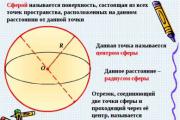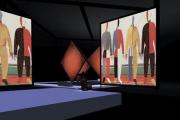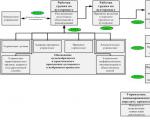- Marik, where have you been? — a neighbor who came from a Dagestan village asked my friend. He remained silent a couple of times. When she again addressed him in this way, he said: “Sorry, Marik is in kindergarten inflates the balloon. I was also “Marikom” for my grandfather. And for you I am Mark Alexandrovich. And he slammed the door in her face.
Familiarity
He often doesn’t understand why he should respect some neighbor Alyoshka, who is old enough to be his grandson, and call him “Alexei Petrovich.” While, despite his age, “Alyoshka” can head a department at a university, and he himself can be a retired mechanic. Well, at least he has life experience!
The habit of poking and lecturing is completely uncharacteristic of Muscovites and St. Petersburg residents, who prefer polite treatment and notice such things as social status and education.
It’s another matter if the person himself personally asked you to call him first name. So, for example, a former neighbor, by the way, of princely origin and a teacher of foreign languages at MGIMO, asked to call her Lida. By the way, Lida was nearly 80 years old, and she held herself up superbly.
Time shift

The provincial habit I hate is not understanding that all people work in different times. If you come to visit another city and are staying with someone, they will definitely push you away in the morning, at about 7 o’clock. Well, why if it’s morning, then you need to get up and run ahead of the locomotive?
Such people also do not understand that for others the evening ends at a different time. They will call at half past six in the morning with the words:
- How are you? And I’m already at work!
— And I did a report from the exhibition, and then edited it until 5 am.
This happens even in hotels. One of my friends told me: A difficult, long flight with transfers during a business trip to Oman. Finally in the room. I fall asleep instantly. At about 6 am (!) there is a knock on the door, then the key turns in the keyhole. I barely have time to cover myself with the blanket. On the threshold is a young Pakistani man with a tray of fruits:
- A compliment from the chef! I would also like to tell you about the possibility of additional room service...
He almost kicked him out the door without allowing him to finish.
Lack of sense of proportion

One of the main habits of provincials is the habit of eating and drinking for future use. They have an eternal fear that today there is delicious food, but tomorrow it may not be there. This is one of the reasons why almost all of them are overweight. A person who claims that he is not hungry, simply by seeing the table set, and that others are sitting down, certainly sits down with everyone else and begins to eat greedily.
In addition, provincials are characterized by the habit of finishing their food, inability to use cutlery, and ignorance of the sequence of dishes. So, after borscht, they can immediately start eating salad or cakes, almost mixed together. The habit of pricking a whole piece of meat onto a fork and biting it while tilting your head is the most monstrous thing I have ever observed.
“Do you think I’m thirsty? - asks the hero of the film "Big Change", - also for future use! And the same hard worker, but with a sense of his own dignity, mocks him, paying for soda from the machine. He drinks until he feels sick. Such people have no sense of proportion at all.
Spying on neighbors, need for their approval

Another habit that is typical for residents of small towns, where everyone knows about everything at once. This is spying on neighbors, trying to take a direct part in their lives, especially when they don’t ask for it. They love to give advice on how to dress and comb your hair and stop you when you are rushing to the store or pharmacy with the words: “What are you doing, where are you going? You haven’t been seen for a long time!”Such a person may not notice you for months, but after buying a new car, he will shout to the whole yard, “Vasya, my dear! Where are you now? and not let go, deliberately asking questions until you praise his purchase.
Provincials always care about who is dating whom, who is pregnant or has given birth to whom, and how much was paid for this or that book. Remember, in the film “The Nameless Star,” the station chief in a small town asks Marin (in some productions he is called Mario) Mira how much a book on astronomy costs and where the poor teacher got that kind of money!
In general, this film shows the best that is in the provincials - the sincerity, purity and gullibility of Mario and his friend, the music teacher, and the worst - the envy and hypocrisy of Mademoiselle Kuku, who imagines herself to be the arbiter of justice. She tracks down students at the station watching the passing trains from Bucharest, but in fact this frantic activity is only a cover for her loneliness and lack of demand.
Fear of appearing poor

In one of his autobiographical books, the entrepreneur talks about how he started selling newspapers as a boy and working part-time at a golf club for the rich. There he remembered a conversation between two elderly millionaires:
I was once amazed by the boss for whom I worked. She is a wealthy woman, built a house in Serebryany Bor and at that time drove an amazing car, of which there were only a few in the city. I took some food that was usual for me from the store, I think it was Norwegian salmon and sturgeon. She looked at me and said:
- Well, you are gorgeous! But I can’t afford this... Unless for a big holiday.
The rich and successful are not afraid to say: “But this is expensive for me,” “I don’t have that much money,” “I can’t afford it,” etc. But if you take a “weak” person who is limited in funds, saying: “Why are you taking not Perrier, but Bon Acqua? Are you a beggar or something? there is a great chance that it will bend instantly. This psychology is often used by salespeople in stores. They say: “Well, a laptop for 25,000 is only suitable for a child. Do you need a normal computer? Look, just 87,500 rubles! Inexpensive, right? Well, yes, and he himself receives 30,000 a month, but he swears and swears that this is mere pennies.
Georges Simenon in his novel “I Remember” wrote that the best gifts for Christmas were received by the children of the provincial poor: luxurious rocking horses and a lot of sweets, which he envied. These were people living one day at a time, who did not save money for university education and the future of their children, and therefore filled them with souvenirs and toys.
And is that how you understand this word?
Today, you can lead a healthy lifestyle and engage in self-development, but at the same time continue to damage your physical and emotional health. The list of bad habits and addictions is huge - from passion for shopping to unhealthy relationships. However, the craving for one form or another of self-destruction has good reason to exist.
Conscious adults nest on the steps of office buildings and are ready to give up lunch to smoke another cigarette, or from the very beginning of the week they wait for Friday, when they can afford strong alcohol. The main conclusion that I made for myself in this matter is that any habit is functional. In general, this thesis is confirmed by the experience of other people and the mastodons of psychological science. Man as a system as a whole strives, at a minimum, for survival - therefore, the craving for destructive bad habits has deep roots and reasons for existence.
But why?
One of the main reasons for the existence of any bad habit is a general state of anxiety. Confirmation of this can be found in the scientific literature and by analyzing personal experience. In practice, my clients often learn to recognize and be aware of their feelings - and almost unanimously come to the following conclusion. An unconstructive action in itself is performed as a response to tension that seems to increase on its own. And then even the banal bad habit of squeezing your shoulders towards your head leads to short-term relief. The conditions for this may be different, but the goal is the same - to get some kind of positive emotion and at least relax a little.
When do we worry? As a rule, when we don’t feel safe. These could be some very specific and specific situations: for example, a report to management or a meeting with the husband’s relatives. It is also possible that enormous stress has become a natural part of life and is associated with much deeper reasons, such as very low self-esteem or the belief that everything is hostile. And here, as usually happens, it’s time to remember childhood.
Mom, dad, me

A person comes into this world completely open to everything. He still has no ideas about good, evil, other people, he is interested in doing everything, and he still treats himself and others well. Much of what he sees around him, and primarily in the actions and worldview of his parents, adds up to his undeniable picture of the world, a kind of map of reality. Using this navigation system, he moves on through life. And what happens? Most families have unspoken rules that prohibit a lot of things in the first place. These rules often become decisive in the life navigation system: “don’t talk,” “don’t think,” “don’t feel,” “don’t trust,” and ultimately, just “don’t be yourself.”
Parents convey to us their idea of the world and how to better get along in it, however, in essence, such concern leads to one single conclusion: “as I am, I am not needed, I have no right to be open, vulnerable, imperfect" and so on. Through trial and error, we learn to adapt to the unwritten rules about what is possible and how best to adapt to the existing framework. Since mom, dad and other significant adults in children's perception are smart and all-knowing protectors, everything they broadcast is accepted as the ultimate truth. Unfortunately, at the same time we do not receive enough support and recognition to feel our worth and the power to trust ourselves and others. This is how the first shoots of fear and expectation appear that this or that action will lead to rejection by the native pack or some other negative consequences.

It turns out that they have adapted, but the desire to receive support and recognition remains unsatisfied. Growing up, a recent child becomes an integral part of society and already begins to look for people in it who, in his opinion, can provide him with care, safety and affection. Sometimes these are companies of leaders in which it is customary to smoke and drink alcohol - and in an effort to feel more confident, to be close to the “strong” people, they become acquainted with the first cigarette and glass. Someone goes to virtual reality because it is easier to achieve success and be a hero there. Others simply try to extinguish unpleasant feelings by changing their states of consciousness in every possible way or, at worst, by abusing junk food. Still others scratch themselves or shake their legs - and thus achieve relative calm. Everything is individual here.
I really like one philosophical concept, which, in fact, is consonant with the point of view from psychology. She says that every person has a large supply of vital energy. And this is not just a reserve, but a kind of targeted funds: for the realization of talents, abilities, to the maximum effective development. If this energy is spent “in the wrong way” or is not used on the existing scale, then it seems to begin to press from within and create tension. Bad habits “eat up” part of this resource, but internal unfulfillment continues to create tension and, as it were, push us towards integrity and self-love. It turns out that once upon a time we learned to adapt to other people’s expectations and forgot how to hear ourselves. Anxiety that leads to destructive, strange behavior is just a signal that we once did not have enough love and support. But everything can be fixed.
Getting rid of bad habits

Why I love neuroscientists is because they can logically explain many previously not particularly provable things. It turns out that habits are literally physically reflected in the structure of the brain. If we regularly perform some action, then a somewhat trodden path of neural cells appears. In this way, the brain saves our own resources and we already automatically react in similar circumstances. Some signal came from outside - and the path “lit up”, and after a while you discover that, for example, you’ve been biting your nail for a minute and a half. There is good news: even the most stable connections can be corrected or replaced with new ones. Essentially, the nervous system can be trained in the same way we train our muscles and reflexes. New skills are formed especially quickly when they are associated with pleasure and pleasant emotions.
It happened this morning. On the way to work. Before this I only encountered something like this on YouTube.
I pass a trolleybus stop. And we have a blunt terminal branch. The trollers on both sides are right on the side of the road. And if there are a lot of them, sometimes it really interferes with leaving. Well, that's not the point.
I have a bad habit. If I'm not sure, I don't overtake. And I don’t drive on red. Sorry, my upbringing in the USSR was bad. So, approaching the stop, I see a trolleybus, and, remembering our pedestrians who walk around it, both behind and in front, I drop it to 40. This causes the wrath of the happy owner of a Daewoo Nexia rushing behind. But healthy po#ism is on my side and I don’t speed up. At this moment, a Lexus driving in the oncoming lane suddenly jumps into my lane, which already provokes my justified anger. Naturally I slow down. And suddenly a picture. From behind a trolleybus, a man jumps up and falls sideways towards me under a stopped car. I wanted to hit the hood, but fell on the asphalt. I go out to express my “ugh” to this poor fellow, but the Lexus driver is ahead of me. It turned out it was a girl. The man-victim saw her, and under a fairly hard kick in the ass from her side with a quiet one - oh, again! – broke in the morning.)))
It turned out that this guy is one of those who engage in this type of extortion. The girl from Lexus lives nearby. And he was already jumping under it. She wasn't so much hurt as she was scared. Therefore, when she saw him, she did not blink her headlights. As she explained it to me, she thought that I would not understand what was happening. But she risked swerving into oncoming traffic.
And we say “a woman is driving...”, etc. Not all.
Thanks girl!)))
I live near the final metro station, so in an empty carriage on the way to work I almost always sit in the same place: a habit that is second nature. Often a young woman with a thick dark red bob, expensive glasses and for some reason wearing thin surgical gloves sits next to me or opposite me - if you don’t look closely, you won’t notice. We sometimes smile at each other, mutually appreciating punctuality.
So yesterday, sitting down next to me, the Doctor, as I nicknamed her in my head, pulled off her autumn cashmere gloves and found herself in her sterile ones. I couldn’t resist and asked with my gaze, “Why?”
“You see, I’m a doctor...” the Doctor answered in an unexpectedly low, pleasant voice. I guessed it right.
- I thought doctors change clothes in the clinic?
- You see... (looks towards the homeless man snoring on the end bench) I am a doctor... a dermatologist.
Sometimes, even having all the prerequisites for happy life(family, wealth, success, love), we don’t feel happy. Why is this happening? What's stopping us? Cornell University professor Thomas Gilovich believes that habit is to blame. It turns out that fortunately they also get used to it. kills love, colors life in gray tones, deprives us of joy and happiness. But without her we could not live at all.
Habit is a symbol of stability
“A habit has been given to us from above: it is a substitute for happiness”, wrote A.S. Pushkin. Obviously referring to the relationship between the old Larins, which gradually turned from love into a habit. However, Alexander Sergeevich was quite approving of such patriarchal relationships, which were essentially close and warm. That is, such as he himself partly dreamed of, having moved with Natalya Nikolaevna to the village, away from balls and social gossip. Many of us fear habits in relationships like fire. After all, it kills novelty, passion, interest in each other. But life without habit is difficult; most of our daily affairs and operations are built on it. We would spend a lot of effort, energy and time on the simplest things if we didn’t have habits. To some extent, they make our life easier, making it, in a certain sense, stable and safe.
Not too bad either. We know what to expect from this or that situation, how a loved one will behave, how we ourselves will react to this or that event. No surprises. That is, living with each other for a long time, we can predict the possible development of events and sometimes prevent aggravations and troubles.
Good habits, for example, decorate our lives. The habit of kissing each other before leaving the house, the habit of asking about the day in the evening, the habit of taking care of each other, helping in solving difficult problems, giving gifts, giving advice - all this creates in our family special world, a warm family atmosphere that helps us relax after a difficult working day, feel more confident and calm. Actually, this is precisely why a person needs a family.
But even such an environment becomes familiar over time and causes us boredom and associated indifference. We begin to take this family warmth for granted, for granted. We don’t think about the fact that we need to be grateful that someone cares about us. We get used to the good and do not perceive it as good. We want some other, sharp, unusual sensations. And we start looking for them on the side.
Habit is the enemy of happiness
Just as reaching the top becomes commonplace when you stand at the top, so any event in life, any relationship, having reached a certain level, becomes familiar, as if covered with the dust of ordinaryness. Having received satisfaction from them once or twice, we, like drug addicts, demand a new dose of impressions. A relationship habit that is devoid of deep love and affection ultimately leads to
boredom. People have nothing to talk about, they are bored with each other;
indifference. They are not interested in each other's lives, although formally they can ask about it;
isolation. Everyone withdraws into their own little world, fences themselves off, tries to spend time separately;
lack of communication. Communication is formal. People only talk about business matters.
If such a family Armageddon comes, it’s hard to call it happiness, it’s a HABIT. Habit without love. What could be worse than such a relationship? However, some people live like this all their lives. Personally, I don’t like this kind of family. What about you?
How to escape the habit?
Cornell University psychology professor Thomas Gilovich has proven that habits reduce happiness, but you can increase it by acquiring new habits or by achieving new “heights.” After all, a person can experience a surge of happiness not only from mutual love, happy shopping, but also from travel, contemplation of beauty, creative activity. Moreover, if getting used to a purchase occurs very quickly, then the impressions of traveling or interesting communication with unusual people remain with the person for a long time. Even more emotions and joy are brought to us by some kind of joint activities with elements of challenges, adventures or the acquisition of new skills. Any extreme experience is a kind of reserve of happiness with which we are fed for future use and for a long time after that it supplies us with joy.
The professor advises to experience happiness not from acquisitions, but from adventures. Create conditions for receiving new impressions, do not sit in front of the TV or computer, it is better to leave the house and walk down the street. Better yet, buy a ticket and go away from home. The more often we arrange impulsive, spontaneous adventures for ourselves, the more varied and fuller our life becomes, even if habit has crept into it.
New good habit every day
There is another way to avoid habits in life, this is. Brett Blumenthal (wellness expert and bestselling motivational author) wrote an excellent book about this called One Habit a Week. She suggests constantly working on yourself, acquiring a new good habit every week. Remember the proverb: “If you sow an action, you will reap a habit; if you sow a habit, you will reap a character; if you sow a character, you will reap a destiny.” Depending on what habit you acquire, such will be your fate.
What kind of habits could these be?
For example, habit of working with hands. “He who works with his hands is a worker. The one who works with his hands and head is a master. He who works with his hands, head and heart is an artist.”. (Francis of Assisi) People who know how to do something with their hands create happiness for themselves with their hands, improve their mental state, and add joy to life. It can be anything: knitting, sewing, embroidery, macrame, cooking, plant care. Whatever your hands touch, your heart inevitably touches. Another great habit - thank. Say thank you to everyone and everyone, even to the morning ray of sun that penetrates through the window into your home.
The habit of smiling.
The habit of saying and thinking only good things about people.
The habit of doing something useful and kind every day.
The habit of noticing something unusual in ordinary things.
And also habits:
stop disputes;
overcome fatigue;
expand consciousness;
keep affairs and home in order;
find time for yourself;
listen to silence;
rejoice in your achievements;
create and be an example for others.
Living is a great joy and a lot of work, first of all on yourself. To prevent love and life from becoming a habit, do not lose emotional contact with your loved one and yourself. Constantly keep yourself in tune with interest in each new day. Remember, the main habit is to love each other and love life.























